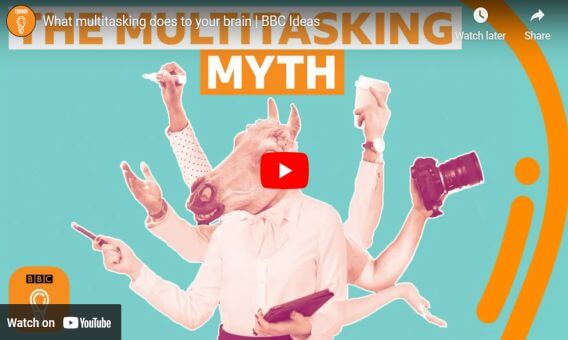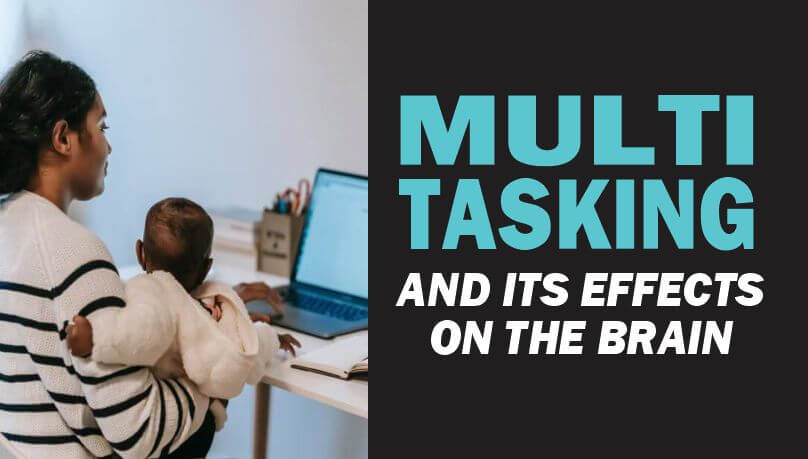Last updated on February 24th, 2025 at 06:54 pm
Discover the top 10 multitasking skills you should possess to succeed in various aspects of life.
Being able to manage multiple tasks concurrently not only enhances productivity but also improves efficiency.
While multitasking is a subject of debate, especially as it concerns multitasking in teenagers, its benefits cannot be overlooked.
In this blog post, we will explore the top ten multitasking skills that everyone should possess to succeed in various aspects of life.
Related: Impatience: Causes, Signs and Remedies
An Overview of What Multitasking is

Multitasking is the ability to perform multiple tasks simultaneously or in quick succession.
It involves dividing one’s attention and focus across different activities or responsibilities. Multitasking can occur in various contexts, such as work, school, or personal life.
It often requires juggling between tasks, managing time efficiently, and rapidly switching between different cognitive or physical demands.
While multitasking can enhance productivity and efficiency, it can also lead to decreased performance, errors, mental exhaustion and brain damage.
Ultimately, successful multitasking relies on effective prioritization, organization, and the capacity to handle multiple demands without compromising quality.
ALSO READ: How to Apply Self-management to Stay Organized
10 Multitasking Skills
1. Prioritization and Time Management
Effective multitasking starts with prioritizing your tasks and managing your time wisely.
Develop a system that helps you identify urgent and essential tasks, while ensuring that you allocate the necessary time to complete each task efficiently.
2. Task Delegation
Learning to delegate tasks is an essential multitasking skill. Recognize when others can contribute and assign them relevant responsibilities.
Delegation not only lightens your workload but also promotes teamwork and empowers others to enhance their skill set.
Also Read: Why Emotional Intelligence Matters: A Review of the Book
3. Efficient Communication
Being able to communicate effectively is crucial when multitasking.
Enhance your multitasking abilities by maintaining open lines of communication, clarifying expectations, and keeping team members informed.
Utilize various communication channels, such as email, instant messaging, or phone calls, to stay connected.
4. Flexibility and Adaptability
Multitasking often requires adapting to changes and unforeseen circumstances.
Cultivate flexibility by adjusting your plans and strategies quickly when necessary.
This skill allows you to tackle sudden challenges without losing focus on the primary objectives.
5. Stress Management
Juggling multiple tasks can be stressful, but learning how to manage stress is essential for successful multitasking.
Develop healthy coping mechanisms, such as deep breathing exercises, meditation, or time management techniques, to maintain a calm and composed demeanor during chaotic moments.
Related: How To Improve Your Intuition and Attune With The Infinite
6. Organizational Skills
Strengthening your organizational skills is vital to multitasking effectively.
Keep your workspace tidy, use task management tools or digital calendars, and create to-do lists to prioritize and structure your tasks efficiently.
Being organized not only enhances productivity but also reduces the likelihood of errors or oversights.
7. Active Listening
Active listening is a valuable skill that improves multitasking abilities.
By focusing on the speaker and comprehending their message, you can accomplish other tasks while effectively participating in discussions or meetings.
Active listening ensures you don’t miss crucial information or details while multitasking.
Related: Managing Time: How To Make The Most Of Your Day
8. Decision-making Skills
Multitasking often requires making quick decisions amidst competing demands.
Strengthen your decision-making abilities by analyzing information, considering various perspectives, and evaluating potential outcomes.
Effective decision-making amidst multitasking can significantly impact the overall success of your endeavors.
Related: How to Overcome Self-Mastery Hindrances
9. Information Processing
Being able to process information efficiently is a vital skill for multitasking. Practice quickly absorbing and understanding new information, filtering out irrelevant details, and extracting key insights.
Strengthening your information processing abilities enables you to navigate various tasks simultaneously with ease.
10. Self-Care and Work-Life Balance
Maintaining a healthy work-life balance is crucial to effective multitasking.
Prioritize self-care by ensuring you have dedicated time for relaxation, hobbies, and spending time with loved ones.
Stress and burnout hinder multitasking abilities, so it is important to strike a balance between work and personal life.
Also Read: Beliefs that Will Stunt Your Personal Growth
Examples of Multitasking Skills
- Checking emails and at the same time working on a report
- Answering phone calls while working on a project
- Texting or instant messaging while attending a meeting
- Checking social media while completing an assignment
- Doing laundry or cleaning while also tending to children or pets
- Preparing a meal while also helping children with homework
- Listening to music while reading a book
- Talking on the phone while cooking dinner.
- Playing a musical instrument while singing
- Reading a book while listening to an audiobook
- Texting while walking
- Writing an email while attending a meeting
- Checking social media while watching a movie.
Related: What is Irritability? Causes and Signs
Developing Effective Multitasking Skills

Developing effective multitasking skills involves honing cognitive resilience and attentional control, as well as engaging in targeted training and practice.
Here’s how to achieve this:
Building Cognitive Resilience and Attentional Control: Strengthening cognitive resilience through practices like mindfulness and attentional control techniques can help individuals better manage distractions and maintain focus while multitasking.
Enhancing Multitasking Abilities Through Training and Practice
Mindfulness and Meditation Techniques: Engaging in mindfulness and meditation practices can improve attentional control and reduce cognitive overload, ultimately enhancing one’s ability to multitask effectively.
Cognitive Exercises and Brain Training Programs: Participating in cognitive exercises and utilizing brain training programs can help individuals improve their ability to switch between tasks, maintain focus, and manage competing demands more efficiently.
Seeking Professional Help or Guidance, if Necessary: In some cases, seeking professional guidance from cognitive psychologists or coaches can provide personalized strategies for developing effective multitasking skills and managing cognitive load.
Related: Why the Intuition of Women is More Powerful Than That of Men
Watch this Video on What Multitasking Does to Your Brain (3min 17sec)

Frequently Asked Questions
What is multitasking skills?
Multitasking skills involve the ability to efficiently juggle multiple tasks simultaneously, often leading to divided attention and reduced overall performance.
Final Thoughts
Mastering the ten multitasking skills outlined above can greatly enhance your productivity and efficiency in today’s multitasking-driven world.
As you integrate these skills into your daily routines, you will witness a significant improvement in your ability to handle multiple tasks simultaneously, leading to increased success both personally and professionally.
Remember, practice makes perfect, so don’t be discouraged if multitasking doesn’t come naturally at first – with determination and effort, you can soon excel in this vital skill.
References
- VeryWellMind: How Multitasking Affects Productivity and Brain Health Multitasking
- Hoffstetter: How Multitasking Affects Productivity and Brain Health
- Forbes: Multitasking Damages Your Brain and Career
- Brain Facts: Thinking, Sensing, And Behaving/Thinking And Awareness
- Mobile device use while driving — United States and seven European countries, 2011. Centers for Disease Control. March 15; 62(10);177-182 (2011).
- Charron S, Koechlin E. Divided representation of concurrent goals in the human frontal lobes. Science. 328(360), 360-363 (2010).
- Clapp W, Rubens M, Sabharwal J, Gazzaley A. Deficit in switching between functions underlies the impact of multitasking memory in older adults. Proceedings of the National Academy of Sciences of the United States of America. 108(17), 7212-7217 (2011).
- Sanbonmatsu D, Strayer D, Medeiros-Ward N, Watson J. Who multi-tasks and why? Multi-tasking ability, perceived multi-tasking ability, impulsivity, and sensation seeking. PLOS One. 8(1), e54402 (2013).
Pious Clements is the insightful voice behind "The Conducts of Life" blog, where he writes about life ethics, self-development, life mastery, and the dynamics of people and society.
With a profound understanding of human behaviuor and societal dynamics, Pious offers thought-provoking perspectives on ethical living and personal growth.
Through engaging narratives and astute observations, he inspires readers to navigate life's complexities with wisdom and integrity, encouraging a deeper understanding of the human experience and our place within society.

